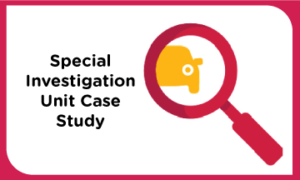Adjusters look for suspicious loss indicators (SLIs) or “red flags” that indicate potential fraud when handling claims. A common SLI for theft fraud is if the “stolen” vehicle was recently purchased or if additional coverages were added to the policy just prior to the vehicle going missing.
This claim arises from the disappearance of the policyholder’s vehicle, an SUV, from the parking garage of a high-rise apartment complex in another state. The vehicle had a stated value endorsement of around $80,000 for comprehensive coverage, and the policy was incepted only one month before the alleged theft occurred. A comprehensive claim was filed in the amount of the stated cash value of the SUV.
The female policyholder advised that she is a self-employed entrepreneur and the sole proprietor of a business located in Maryland. However, the SUV held a temporary tag issued in a state other than Maryland (which is another SLI). And it was registered under the names of a male who was not our policyholder and a used car dealership – yet another SLI, that the registration was not in the policyholder’s name.
The policyholder stated the SUV was taken from the parking garage of the apartment building where she was house-sitting for her boyfriend. This apartment complex featured gated parking garage access, which requires property-issued key fobs for tenants and guests to enter.
The building management conveyed to our policyholder that their video surveillance captured the insured vehicle exiting the parking garage at 2:42 a.m. on the date of loss. The driver could not be identified from the video. Our policyholder claimed she still had the keys in her possession during and after the SUV disappeared.
The claims adjuster correctly identified suspicious indicators regarding this alleged theft: transponder key technology, garage access, and questionable vehicle ownership and title. The claim was referred to Maryland Auto’s Special Investigations Unit (SIU) for further investigation and confirmation of evidence.
To clarify how the thief was able to operate the SUV without the transponder key, the adjuster requested an Examination Under Oath (EUO) of the policyholder. During the EUO, the policyholder advised she purchased the insured vehicle for $80,000 in cash but failed to register the SUV in Maryland in her own name. The out-of-state title indicated a sale price of $77,000.
She also claimed that when she purchased the vehicle, she was only given one transponder key. She advised that no one else drives the vehicle or has access to the keys, which she keeps on her person. She was able to provide a photograph of the lone transponder key.
The policyholder stated that she spent a few days and nights alone at the high rise while her boyfriend was out of town. She parked the SUV in the gated parking garage, which is 20 stories below the apartment, a few days prior to the theft and left it locked. She drove her other vehicle, a sedan, for daily use during this period. She testified that she used the sedan because she considers this to be her personal vehicle, while the SUV is her business vehicle.
On the evening/morning of the theft, the policyholder patronized a nightclub with a friend. She returned to the apartment via Uber at 1:53 a.m., which she was able to verify with a receipt. This places the policyholder at the high rise before surveillance video captured the SUV driving away from the garage at 2:42 a.m.
The policyholder was unfamiliar with transponder technology. She appeared surprised to learn that it is impossible to start and operate the SUV without the transponder key.
Ultimately, the claim was denied for insufficient evidence that a theft occurred, questionable facts regarding the defeat of the transponder key, and her insufficient explanation as to why she had two vehicles at her boyfriend’s apartment at the same time.
Thanks to the training and vigilance of our claims adjuster, this questionable claim was referred to the Special Investigations Unit (SIU). While not every claim our SIU Team receives is fraudulent, it is important to investigate each suspicious claim thoroughly. Claims fraud costs the insurance industry approximately $34 billion each year. And those costs trickle down to the U.S. families, costing between $400 and $700 in increased premiums each year.




